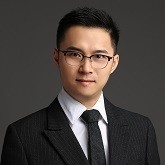About the Editors
Editors-in-Chief
George Miller, MD, Holy Name Cancer Center, United States of America
 Dr. George Miller is Division Chief of Surgical Oncology and the Medical Director of Oncologic Surgery at the Holy Name Cancer Center, USA. Prior to this he has served as a surgical oncologist based at Trinity Health Of New England in Connecticut, Chairman of Surgery at NYC Health and Hospitals (Woodhull) and is a former H.L. Pachter Associate Professor of Surgery and Cell Biology at New York University (NYU) School of Medicine. He is a summa cum laude Phi Beta Kappa graduate of Columbia University and of McGill University Faculty of Medicine. He started his laboratory at NYU in 2007 after completing his clinical and research training at NYU and at Memorial Sloan Kettering Cancer Center. His laboratory grew incrementally in both size and in quality of work to become one of the leading cancer immunology research programs in the United States. His research is focused on the role of innate immunity in driving the inflammation-cancer paradigm in the liver and pancreas. He has published exciting work in high impact journals including Nature, Cell, Nature Medicine, Cancer Cell, Journal of Experimental Medicine, and Journal of Clinical Investigation. Dr. Miller has been awarded more than 60 federal and private research grants. In addition, the findings from his lab have been translated to 4 separate innovative immunotherapy clinical trials in pancreatic cancer. He has developed partnerships with industry to help bring new immunotherapies to the clinic and also co-founded NYBO Therapeutics where is he developing novel immunotherapy drugs based on work in his lab.
Dr. George Miller is Division Chief of Surgical Oncology and the Medical Director of Oncologic Surgery at the Holy Name Cancer Center, USA. Prior to this he has served as a surgical oncologist based at Trinity Health Of New England in Connecticut, Chairman of Surgery at NYC Health and Hospitals (Woodhull) and is a former H.L. Pachter Associate Professor of Surgery and Cell Biology at New York University (NYU) School of Medicine. He is a summa cum laude Phi Beta Kappa graduate of Columbia University and of McGill University Faculty of Medicine. He started his laboratory at NYU in 2007 after completing his clinical and research training at NYU and at Memorial Sloan Kettering Cancer Center. His laboratory grew incrementally in both size and in quality of work to become one of the leading cancer immunology research programs in the United States. His research is focused on the role of innate immunity in driving the inflammation-cancer paradigm in the liver and pancreas. He has published exciting work in high impact journals including Nature, Cell, Nature Medicine, Cancer Cell, Journal of Experimental Medicine, and Journal of Clinical Investigation. Dr. Miller has been awarded more than 60 federal and private research grants. In addition, the findings from his lab have been translated to 4 separate innovative immunotherapy clinical trials in pancreatic cancer. He has developed partnerships with industry to help bring new immunotherapies to the clinic and also co-founded NYBO Therapeutics where is he developing novel immunotherapy drugs based on work in his lab.
Justin Stebbing, MD, PhD, Anglia Ruskin University, United Kingdom

Professor Justin Stebbing was a Professor of Cancer Medicine and Oncology at Imperial College, London (2009-2022), specialising in a range of malignancies, their treatment with immunotherapy (breast, GI and lung and clinical trials) and linking the laboratory to the clinic and vice versa and is now a visiting Professor there and a Professor of Biomedical Sciences at ARU Cambridge. Having originally trained in medicine at Trinity College Oxford, where he gained a first class degree, he completed junior doctor posts in Oxford, and then undertook training and a residency programme in Internal Medicine at the Johns Hopkins Hospital, Baltimore, returning to London to continue his career in oncology at The Royal Marsden and then St Bartholomew's Hospitals. Professor Stebbing’s original PhD research investigated the interplay between the immune system and cancer; he was appointed a senior lecturer in 2007. He is now a visiting Professor at Imperial with an active laboratory programme.
Professor Stebbing has published over 700 peer-reviewed papers, as well as writing regularly for national newspapers and presenting new data on optimal cancer therapies at major international conferences. His focus has been on new therapies in cancer including biomarker-based approaches, with an emphasis on circulating tumour cells and cell free DNA. His laboratory work has concentrated on these areas including new druggable target discovery and gene regulation examining the role of non-coding RNAs in stem cells. His clinical trials have focused on novel mechanisms of action and also biosimilars, democratising expensive treatments. The charity Action Against Cancer www.aacancer.org has been set up to support Justin's work which has the ambitious goal of developing cures.
He is a Fellow of the Royal College of Physicians and the Royal College of Pathologists, and sits on the advisory Boards of a number of international cancer committees. He chaired the World Vaccine Congress and Chaired the Irish Cancer Society oversight committee; he was awarded the Silvia Lawler prize. Justin's team published in Nature Medicine the discovery of a new cancer-causing gene which has now been implicated in many solid tumours, and a drug development programme around this is underway. The National Institute for Health Research (NIHR) awarded Justin its first translational research professorship in oncology, aiming to bridge the gap between the laboratory and the patient to ensure therapy is personalised. In 2016, Justin was elected to the American Society for Clinical Investigation. During the COVID-19 pandemic, papers published by Justin described use of artificial intelligence to find a new treatment, leading to mechanistic and clinical studies for baricitinib and then its FDA approval. In randomised studies, it has the largest mortality benefit for any drug to treat hospitalised patients with COVID-19 and the WHO has placed it at the top of its evidence hierarchy. This simple once/daily tablet has saved thousands of lives and it lends itself for use in low- and middle-income countries.
Conflict of Interest Statement From 2021 - present JS has been Editor-in-Chief of Oncogene and has sat on SABs/advisory boards for Lilly, Agenus, Celltrion, Greenmantle, vTv Therapeutics, APIM, Onconox, IO Labs, Clinical Ink, Zephyr AI, Benevolent AI, Biozen, Pear Bio, Sable Bio and Linkgevity. He has consulted with Lansdowne partners and Vitruvian. He is a board member for Graviton and Etira, and previously BB Biotech Healthcare Trust PLC.
Senior Associate Editor
Georgios Giamas, PhD, University of Sussex, United Kingdom
Associate Editors
Reuven Ahami, PhD, Netherlands Cancer Institute,, Netherlands
Simak Ali, PhD, Imperial College London, United Kingdom
Marcelo G. Bonini, PhD, Northwestern University, United States of America
Mark Bower, PhD, FRCP, FRCPath, Imperial College London, United Kingdom
Jason S. Carroll, PhD, FMedSci, University of New South Wales, Australia
Patrick J. Casey, PhD, Duke University Medical Center, United States of America
Leandro Castellano, PhD, FHEA, University of Sussex, United Kingdom
Biancastella Cereser, PhD, FHEA, Imperial College London, United Kingdom
Dipanjan Chowdhury, PhD, Dana-Farber Cancer Institute, United States of America
Gregory David, PhD, New York University Langone Health, United States of America
Ruggero De Maria, MD, Catholic University of Sacred Heart, Italy
Markus E. Diefenbacher, Dr.rer.nat., Helmholtz Center Munich and Ludwig-Maximilian University of Munich, Germany
Oliver Dorigo, MD, PhD, Stanford University School of Medicine, United States of America
Dean Felsher, MD, PhD, Stanford University School of Medicine, United States of America
Rebecca A. Gladdy, MD, PhD, FRCSC, FACS, University of Toronto, Canada
Gregory J. Goodall, PhD, SA Pathology, Australia
David Guttery, BSc (Hons), MSc, PhD, University of Leicester, United Kingdom
Karen E. Knudsen, MBA, PhD, Thomas Jefferson University, United States of America
Natasha Kyprianou, MBBS, PhD, Icahn School of Medicine at Mount Sinai, United States of America
Nina Moderau, Dipl.-Biol, Dr. rer. nat, Imperial College London, United Kingdom
Silvia Ottaviani, PhD, Nottingham Trent University, United Kingdom
Olivier E. Pardo, PhD, DPharm, FRSB, Imperial College London, United Kingdom
Christopher N. Parris, BSc, PhD, Anglia Ruskin University, United Kingdom
Yufang Shi, PhD, MAE, Soochow University, China
Ying-Jie Wang, PhD, Zhejiang University, China
Ian Watson, PhD, McGill University, Canada
Jindan Yu, MD, PhD, Emory University, United States of America
Jun Yu, MD, PhD, The Chinese University of Hong Kong, Hong Kong
Hua Zhang, MD, PhD, University of Pittsburgh School of Medicine, United States of America
Bo Zhu, PhD, MD, Third Military Medical University, China
Reviews Editors
Joseph Kissil, PhD, The H. Lee Moffitt Cancer Center, United States of America
Dr. Kissil is a Senior Member and Chairman of the Department of Molecular Oncology at the Moffitt Cancer Center in Tampa, Florida. Dr. Kissil’s work focuses on signal transduction pathways and how they regulate cell proliferation. The work ranges in his labs is both basic and translational and employs a host of model systems. Dr. Kissil Received his Ph.D. in Molecular Biology from the Weizmann Institute of Science in Rehovot, Israel, and completed his post-doctoral fellowship training at the Massachusetts Institute of Technology in 2004. Dr. Kissil received several prestigious awards throughout his career including the “Human Frontiers Science Program” Fellowship and an American Cancer Society Research Scholar Award. In 2014 he was awarded the outstanding mentor award by the Scripps Society of Research Fellows.
Shengtao Zhou, MD, Sichuan University, China Dr. Zhou is a physician scientist based in the State Key Laboratory of Biotherapy and West China Second Hospital, Sichuan University. His research team endeavours to use systems biology approaches to map the signaling networks that govern reciprocal cross-talks between different cellular components in the tumour microenvironment and to identify potentially novel cancer therapeutics. Dr. Zhou received his M.D. in Clinical Medicine in Sichuan University, Chengdu, China and was promoted to full professor in 2018. He now sits on the advisory boards of a number of internationally prestigious journals and has received a number of renowned awards including National Excellent Young Investigator Award of China in 2018 and the National Young Cancer Investigator Award of China in 2019.
Dr. Zhou is a physician scientist based in the State Key Laboratory of Biotherapy and West China Second Hospital, Sichuan University. His research team endeavours to use systems biology approaches to map the signaling networks that govern reciprocal cross-talks between different cellular components in the tumour microenvironment and to identify potentially novel cancer therapeutics. Dr. Zhou received his M.D. in Clinical Medicine in Sichuan University, Chengdu, China and was promoted to full professor in 2018. He now sits on the advisory boards of a number of internationally prestigious journals and has received a number of renowned awards including National Excellent Young Investigator Award of China in 2018 and the National Young Cancer Investigator Award of China in 2019.
Social Media Team
Aleksandra Dabrowska, PhD, University of Essex, UK
Dr. Dabrowska is currently working as a postdoctoral research associate at Imperial College London with her research focus being on the role of post-transcriptional gene regulation in cancer development. Her current project involves looking at Dicer proteins in the context of breast and prostate cancers. She is passionate about science and communicating its value to fellow researchers as well as lay audience!
Twitter: @AleDabrowska
Sladjana Zagorac, PhD, Spanish National Cancer Research Center, Madrid, Spain
Dr. Zagorac is a molecular biologist with a keen interest in epigenetics. Since her PhD she has started investigating how different epigenetic modifiers can shape the biology of cancer stem cells in pancreatic cancer. Continuing on that she started as a Postdoctoral Research Associate at Imperial College London, where her current research is focused on non-coding RNAs in stem cells of breast and pancreatic cancer.
Twitter: @Slaya_Zagorac
